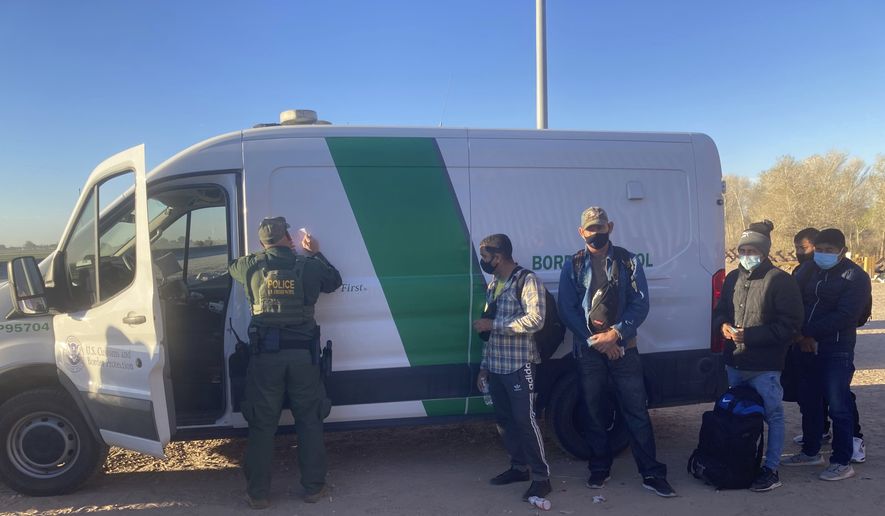The Supreme Court cast doubt Wednesday on the way the Biden administration nixed a Trump-era rule pushing legal immigrants to be self-sufficient, suggesting during oral arguments Wednesday that the government was using subterfuge to try to get its way.
“I’m not aware of a precedent where an incoming administration has done anything quite like this,” Justice Samuel A. Alito Jr. said.
The high court’s members also wondered whether the specific case before them, brought by Arizona, was the right way to challenge the Biden administration’s sneaky moves.
The battlefield underlying the oral argument is a 2019 “Public Charge” rule that punishes legal immigrants for signing up for welfare benefits like Medicaid and food stamps. The Biden administration is trying to erase that rule and replace it with a more permissive one that would permit immigrants to collect welfare without worrying about being punished in future applications.
The fight before the justices Wednesday was wasn’t over the rule or even the legal maneuvers the Biden team has made — but whether Arizona should be allowed to mount a defense of the 2019 policy, now that the Biden team won’t do so.
Arizona Attorney General Mark Brnovich told the justices that even tacit approval of what the Biden administration did would set a precedent future presidents would abuse, using the courts to get rid of previous administration policies without going through the usual regulatory process.
“At least allow the states to step in and defend a federal law when the federal government wouldn’t,” argued Mr. Brnovich, who supports the Trump-era rule.
The actual legal moves involved that generated the case are complicated.
The Trump administration released new strict rules on immigrants’ use of welfare in 2019 and faced a barrage of lawsuits. It was defending the policy, and the Supreme Court had even agreed to hear one of the cases.
But after the election, the Biden team reversed course, droppings the defense of the Trump rule in nearly every courtroom and accepting a ruling from one court in Illinois that had imposed a nationwide blockade on the policy.
The Biden team used that nationwide blockade as a justification to repeal the 2019 Trump policy and start over with a new rule-making process.
Mr. Brnovich moved to intervene in one of the lower court cases, arguing someone should be allowed to defend the rule, but the 9th U.S. Circuit Court of Appeals refused that request. Mr. Brnovich then brought that dispute to the high court.
Justice Amy Coney Barrett said Wednesday the government is always free to change its minds on policy or legal strategy, particularly when there’s a change in administration.
She said it’s a different question to try to block a state from stepping in to mount the defense.
Justice Elena Kagan said she wasn’t so worried about the policy change decisions, but said the Biden administration did seem to be trying to evade the usual rule-making process to repeal the 2019 policy.
“The real issue to me is the evasion of notice and comment. Basically, the government bought itself a bunch of time where the rule was not in effect,” she said. “It would have taken months to change it, and the administration didn’t have to do that.”
She said she worried about “green-lighting that behavior” for future administrations.
But justices struggled to find an answer.
Several court members suggested the states, or other parties, should challenge the Biden administration’s decision-making in federal court in Washington, under the Administrative Procedure Act. Justice Stephen G. Breyer said the court might wait for an already-ongoing case dealing with the 2019 rule to reach the justices.
“My God, I don’t know what the answer is,” Justice Breyer said. “We don’t have to get into any of this mess if we can only get the Illinois case here before us.”
Federal law has allowed the government to block immigrants likely to become a public charge as far back as 1882. But what constitutes a public charge has been debated.
The Trump administration said the law demanded a strict approach and released a formal regulation in August 2019 that covered non-cash welfare, such as food stamps, Medicaid benefits and housing assistance. Those found to be using those programs could be penalized in future applications to become lawful permanent residents — the key stop on the path to citizenship.
Brian Fletcher, the federal government’s deputy solicitor general, said the 2019 rule, while it was in effect, didn’t end up doing very much. Out of more than 47,000 decisions on adjustment of status, just five were flagged because of Trump-era rule.
Yet millions of people, including many for whom the public charge rule never applied, avoided collecting benefits because they feared being snared by the rule, he said.
The Biden administration concluded those collateral effects were too large to justify the rule, Mr. Fletcher said.
• Stephen Dinan can be reached at sdinan@washingtontimes.com.




Please read our comment policy before commenting.